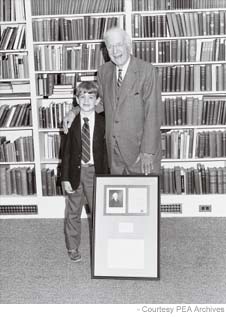
Camp Milbrook In Memoriam
Published by Phillips Exeter Academy
Jackson Barzillai Adkins
1903—2000
In Memoriam
 |
Jackson Adkins, who joined the Exeter mathematics department in 1939, was presented with the Founder’s Day Award in 1988. On hand to congratulate him was David Goldenheim, son of one of his former pupils, trustee Paul Goldenheim ’68. |
| Jackson Barzillai Adkins (Jack to his host
of friends), instructor of mathematics emeritus, was born in Lima, OH,
in 1903. He attended Lima schools, studied for two years at Capital
University in Columbus, OH, taught for two years at Lima Central Junior
High, then earned a Ph.B. at the University of Chicago. Next, Jack
taught for three years in Chicago-area public schools and an additional
three years at the Culver Military Academy. He then attended the Harvard
Graduate School of Education, where, in only 15 months, he gained an
Ed.M. For the next six years, he taught at the Moses Brown School. At
last, in 1939, he found his true home at Phillips Exeter Academy.
Jack will best be remembered by generations of students and instructors as the consummate teacher. Those who had him in class say that he taught by the power of example. They recall his challenging assignments both in and out of the classroom, as well as his famous, and frequent, hour exams. His home became a “home away from home” for many students. He was always welcoming and available to help them in solving problems, whether related to mathematics or to some of the less quantitative aspects of young lives. His ability to listen, sympathize and advise with firm kindness and integrity is still well remembered. Jack’s influence extended well beyond the Academy. Almost as soon as he arrived in Exeter, he set about founding the Southeastern New Hampshire Association of Teachers of Mathematics. He was a director of the National Council of Teachers of Mathematics and a member of the editorial board of The Mathematics Teacher Magazine. He co-authored the Weeks-Adkins series of textbooks, used throughout the country. He also continued, for several years, his relationship with the Harvard Graduate School of Education by serving as a master teacher in the Harvard-Newton Summer Institute Mathematics Program. His enthusiasm for the Academy was so infectious that four of his best students in the program later became valued teachers at the Academy.
In the Second World War, Jack took leave from Exeter, joined the Naval Reserve and taught navigation to officer candidates. This was also during the time of his marriage to Mildred Bruckheimer (known to friends as Mid) who, on their return to the Academy, enhanced the homelike nature of the Adkins’ faculty apartments. Mid also broadened their social life with dinner and bridge parties, where Jack was always a gracious and thoughtful host. Faculty wives remember his including them in the life of the school and making them feel at ease as well. Mid’s care for young people was reflected in her operation of Camp Milbrook in Bridgton, ME. There, Jack fulfilled the role of supportive spouse. With tragic irony, Mid was killed in a car accident in 1966 on her way home after selling the camp. His colleagues remember Jack as being impeccably dressed, whether on the tennis court, in the classroom or at the bridge table. Students remember the click of his short steps on hard Academy Building floors signaling his arrival long before he came into view. They remember too that he expected students also to be reasonably well dressed and always well behaved. Faculty members remember that when the dean of students recited the transgressions of some miscreant student in a Faculty Meeting, Jack frequently exclaimed, “I am appalled!” At some time in his pre-Exeter years, Jack had found opportunities to become an accomplished pianist, thus making a musical career quite plausible. Determined, however, to help his brother through college, he chose teaching mathematics as a financially more reliable pathway. Still, he never lost his love for the piano and found time at Exeter to study both at the University of New Hampshire and with the Academy’s principal piano instructor. He continued to play for his own enjoyment and the pleasure of close friends until long after he had retired. Jack lived alone on Elm Street for 20 years after he retired. During those years, he continued to have frequent bridge games with guests of varying levels of skill. He took great pride in his garden, carefully planning to have his yard abloom with flowers from spring to fall. He enjoyed tutoring Academy students; some of them who were challenged by mathematics swear they owe their diplomas to Jack. In his late 80s, Jack moved into a retirement community in Exeter. There he continued to play bridge from time to time and even to play the piano for a Sunday hymn or two. He died on January 18, 2000. David Arnold ’83 (Hon.) |